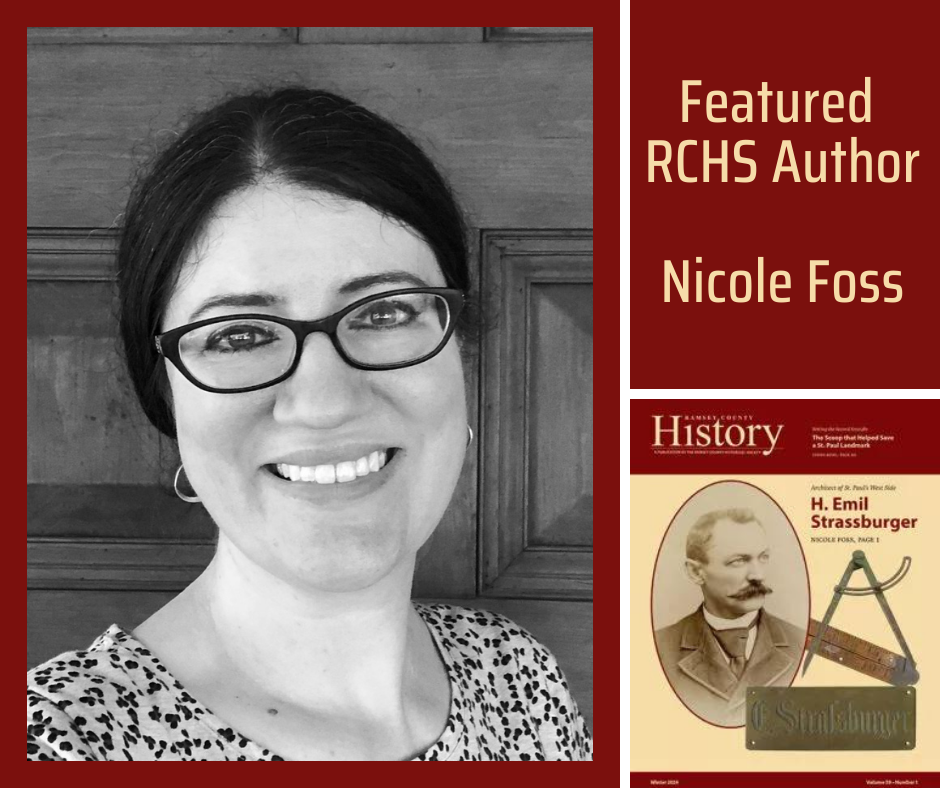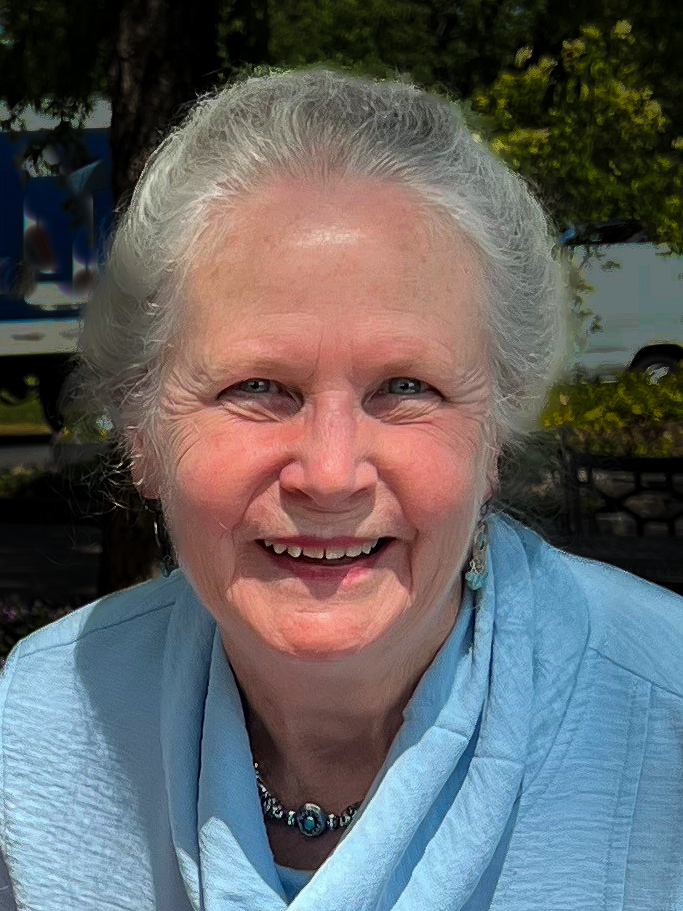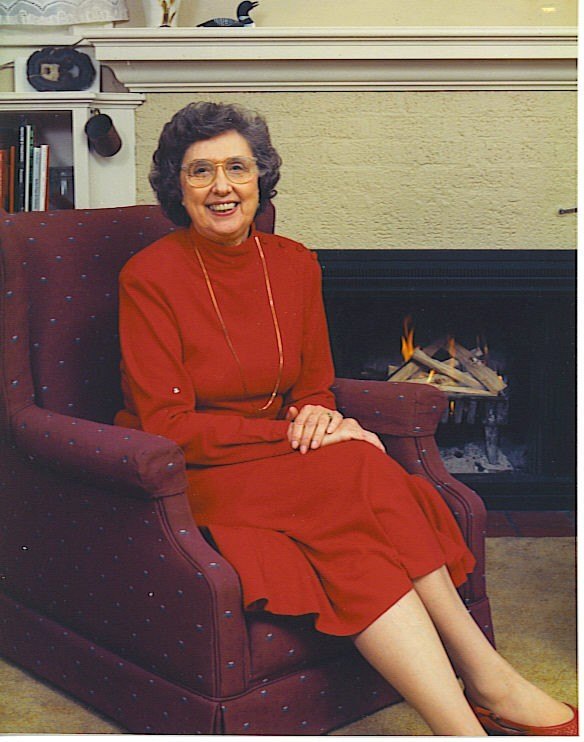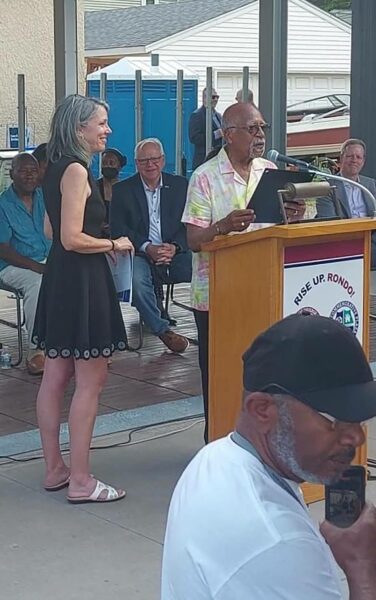Recent Highlights & Awards

HISTORIAN HIGHLIGHT
Nicole Foss, author of “Architect of St. Paul’s West Side: H Emil Strassburger“
Architectural Historian Nicole Foss grew curious about some of the old houses she passed on daily walks in her neighborhood. Curiosity led to research, which evolved into our Winter 2024 cover story “Architect of St. Paul’s West Side: H. Emil Strassburger.” Very little has been published on the German immigrant Strassburger—until now. Most of the business blocks he designed in the late-nineteenth century are long gone, but several residences still stand tall along the West Side bluff. Strassburger’s architectural contributions to this neighborhood are significant. Foss describes Strassburger’s work and his willingness to experiment with the styles of the day, including the Richardsonian Romanesque style, brick interpretations of Stick style with Eastlake embellishments, and at least one exploration in Second Empire-inspired eclecticism.
Nicole Foss is a St. Paul-based architectural historian with a background in archaeology and museums. She has worked on historic preservation projects throughout Minnesota, as well as in several other states, and has a special fondness for St. Paul’s West Side neighborhood.
RCHS PUBLISHING AWARD WINNERS
Minnesota Alliance of Local History Museums Announces 2024 History Award Winners

The Minnesota Alliance of Local History Museums honored ten local history projects with a Minnesota History Award at their annual meeting and conference on April 25, 2024, in Duluth. Of the ten projects selected, Ramsey County Historical Society (RCHS) and four individuals were honored with three awards:
RCHS and Frank M. White (St. Paul) for the article, “From a Star on the Ball Diamond to a Star in the Minnesota State Capitol: Billy Williams.” (Spring 2023).
- “A wonderful article that is well-written, thoroughly researched, and highlights an important individual in Minnesota history.” – History Awards Committee Member
RCHS, Paul D. Nelson, and Jacci Krebsbach (St. Paul/Shoreview) for the article, “The Children’s Preventorium of Ramsey County,” (Winter 2023).”
- “I appreciate the collaborative nature of the research process and the work with other local historical organizations.” – History Awards Committee Member
RCHS and Nieeta L. Presley (St. Paul) for the article, “Traveling Without Aggravation: How Victor H. Green Changed Travel for Black Americans, Green Book Locations in the Historic Rondo Community (1940-1956),” (Summer 2022).
- “I sincerely appreciate the good use of documentation in the article and it certainly covers an important, under-told story in the local context.” – History Awards Committee Member
Many thanks to the judges with the Minnesota Alliance of Local History Museums for this recognition.
2024 David Stanley Gebhard Award from the Minnesota Chapter of the Society of Architectural Historians (Magazine Article Winner)
Christine Podas-Larson, “The Aesthetics of Bridge Design: A Paean to Two of St. Paul’s Elegant Park Bridges,” (Summer 2021).
 The Board of Directors of the Minnesota Chapter of the Society of Architectural Historians presented the David Stanley Gebhard Award in April 2024 to Christine Podas-Larson for “The Aesthetics of Bridge Design: A Paean to Two of St. Paul’s Elegant Park Bridges,” The judges noted, “Christine Podas-Larson looks at two St. Paul bridges to tell the story of civic philosophies united with the local, transformative engineering of new and novel reinforced concrete. Bridge building became cheaper and stronger at a time when beauty for the public good mattered. Here, the reader is introduced to the characters made familiar by street names such as Cleveland and Wheelock, and others not known as well: Wheeler, Wenzel, Turner. . . . The illustrations propel the story forward by situating the reader geographically and historically in an era when our own ‘Mendota Bridge was the longest continuous concrete arch bridge in the world.’ The unnamed preservationists’ advocacy for these bridge restorations are acknowledged, and we are rewarded. In describing the legacy of well-applied building technology combined with spirit-lifting aesthetic beauty, Podas-Larson’s work is well-timed and very well done.”
The Board of Directors of the Minnesota Chapter of the Society of Architectural Historians presented the David Stanley Gebhard Award in April 2024 to Christine Podas-Larson for “The Aesthetics of Bridge Design: A Paean to Two of St. Paul’s Elegant Park Bridges,” The judges noted, “Christine Podas-Larson looks at two St. Paul bridges to tell the story of civic philosophies united with the local, transformative engineering of new and novel reinforced concrete. Bridge building became cheaper and stronger at a time when beauty for the public good mattered. Here, the reader is introduced to the characters made familiar by street names such as Cleveland and Wheelock, and others not known as well: Wheeler, Wenzel, Turner. . . . The illustrations propel the story forward by situating the reader geographically and historically in an era when our own ‘Mendota Bridge was the longest continuous concrete arch bridge in the world.’ The unnamed preservationists’ advocacy for these bridge restorations are acknowledged, and we are rewarded. In describing the legacy of well-applied building technology combined with spirit-lifting aesthetic beauty, Podas-Larson’s work is well-timed and very well done.”
Past RCH David Stanley Gebhard Award winners include:
- 2022 – Magazine article author Jeremiah E. Ellis, “St. Paul’s Distinct Leadership Tradition: A Century of the Sterling Club,” (Summer 2019) and book honorable mention authors Richard Kronick & Jeanne Kosfeld, Neighborhood Architecture – Irvine Park, Saint Paul – a coloring book (2021).
- 2020 – Diane Trout-Oertel, “Emma F. Brunson: The First Woman Registered as an Architect in Minnesota,” (2017).
RCHS VIRGINA B. KUNZ AWARDS
Ramsey County Historical Society (RCHS) has been in the publishing business since 1964. For sixty years and under the direction of just three editors, RCHS has published hundreds of issues of its award-winning magazine Ramsey County History, scores of local history books, dozens of podcasts, and more.
 Virginia B. Kunz started the program and was the longest serving editor from 1964 until her death in 2006. Shortly thereafter, the society established its Virginia B. Kunz award, which is given every two years, to the author or authors of the best article published in the magazine that meets three criteria:
Virginia B. Kunz started the program and was the longest serving editor from 1964 until her death in 2006. Shortly thereafter, the society established its Virginia B. Kunz award, which is given every two years, to the author or authors of the best article published in the magazine that meets three criteria:
- The article has a new, more complete, or corrective contribution to material dealing with the history of Ramsey County, Minnesota,
- The article has an effective balance of appropriate historical research, documentation, and accessibility to a broad audience of readers,
- The article is written in an engaging style and includes appropriate visual materials such as photos, maps, diagrams, or other illustrations that encourage the reading of local or regional history.
A panel of three independent, community judges selected the nominees and chose a winner, who will be named May 28,2024. These judges include: Maureen Acosta, director of corporate and foundation relations at Metropolitan State University; Gabe Horner, a policy and data analyst, coauthor of A Grand History: The Summit Hill Neighborhood’s First 200 Years, and an RCH magazine author; and Rekhet Si-Asar, retired counselor at Minneapolis Public Schools, a community artist, and cofounder and publisher of In Black Ink.
2024 Virginia B. Kunz Nominees and Winners

Ramsey County Historical Society (RCHS) recently presented seven Dakhóta-language scholars with the Virginia B. Kunz Award for their article, “Dakhóta Iápi: A Brief History in Three Parts .” It ran in the society’s Fall 2023 issue of Ramsey County History magazine. RCHS President Chad Roberts made the presentation to a team of current and former University of Minnesota students and researchers, including Deacon DeBoer, Eileen Bass, Justis Brokenrope, Ava Grace, and Heather Menefee; their instructor Šišókaduta; and Dr. Rev. Clifford Canku, a first-language Dakhóta speaker and teacher, at a luncheon at The Landmark Center on Tuesday, May 28, 2024.
The recognition includes a plaque honoring the team’s work and a $200 cash prize for each team member made possible by generous memorial gifts to the society in honor of Virginia Brainard Kunz, the first editor of the organization’s award-winning quarterly publication. The award is given every two years to the author or authors of the best article that meets three criteria:
- The article has a new, more complete, or corrective contribution to material focused on the history of Ramsey County, Minnesota;
- The article has an effective balance of appropriate historical research, documentation, and accessibility to a broad audience of readers; and
- The article is written in an engaging style and includes appropriate visual materials such as photos, maps, diagrams, or other illustrations that encourage the reading of local or regional history.
The team’s work begins with an early history of the Dakhóta language following settler colonization and extending through the boarding school era. It continues with a collaborative segment highlighting current language initiatives and the positive effects these have for both the Dakhóta and non-Indigenous communities in establishing themselves in Minnesota history. It culminates with words of encouragement to Dakhóta-language teachers and second-language learners from Dr. Rev. Canku.
A panel of three independent community judges—Maureen Acosta, retired director of corporate and foundation relations at Metropolitan State University; Gabe Horner, a writer, researcher, and policy data analyst; and Rekhet Si-Asar, retired from Minneapolis Public Schools and cofounder of In Black Ink, a local publishing initiative—selected the winning work from twenty-two articles that published in the magazine in 2022 and 2023. The judges stated, “The Fall 2023 issue is a masterpiece of corrective history. It’s well-documented, and has excellent visuals—as well as twenty-first century technology. . . including QR codes for a new Dakhóta dictionary app. We liked the student work and involvement and that their voices came through. The inclusion of the Dakhóta language in the text allows people to see it, and, when posted online, they can hear it.”
The judges also honored another writer—Nieeta L. Presley—with a Virginia B. Kunz honorable mention for her article, Traveling Without Aggravation: How Victor H. Green Changed Travel for Black Americans: Green Book Locations in the Historic Rondo Community (1940-1956).” The retired director of the Aurora St. Anthony Neighborhood Development Corporation and a Rondo community leader researched the story of Victor H. Green’s Green Book, and then zeroed in on nine businesses in St. Paul that advertised in the publication.
Between 1940 and 1956, these business owners, as well as private homeowners, invited weary and wary travelers to St. Paul’s Rondo neighborhood. Presley scoured city directories and old newspaper articles and advertisements to uncover the histories of these venues where Black travelers were always welcome. Said the judges: “This in-depth and expansive story of resilience celebrated community taking care of community.” Presley received a plaque of recognition and a gift certificate to Subtext Books.
Other award nominees included Kristina Her for her “Hmong Foodways in Ramsey County” article (Summer 2023) and Frank M. White for From a Star on the Ball Diamond to a Star at the Minnesota State Capitol: Billy Williams (Spring 2023).

In addition to the Kunz Award, RCHS presented its second Volunteer Honor to editorial board member Steve Trimble, who has also won two Virginia B. Kunz Awards—one in 2008; another in 2014. President Roberts presented a plaque and gift certificate for Trimble’s volunteer work over twenty-one years as a member of the organization’s editorial board. In that time, Trimble has penned seventeen articles for Ramsey County History magazine, written book reviews, worked on two podcasts, supplied hundreds of history blurbs for RCHS social media channels, and suggested countless creative article ideas. “RCHS is grateful that Steve has been part of our history and has selflessly contributed so much to our publishing program,” Roberts said.
The luncheon program for about thirty-five guests associated with RCHS publishing also highlighted Ramsey County Historical Society’s seventy-fifth birthday this year and noted that its publication program has been running for six decades. The society will celebrate these anniversaries throughout 2024 and into the first quarter of 2025.
Virginia B. Kunz Award Winners 2006-Present
- 2006
- Paul D. Nelson, “Another Lost Neighborhood: The Life and Death of Central Park—A Small Part of the Past Illuminated,” (Fall 2004).
- 2008
- John W. Larson, “He was Mechanic Arts: Mechanic Arts High School—The Dietrich Lange Years, 1916-1939,” (Summer 2006).
- Steven C. Trimble, “If It Can Be Manufactured from the Wood, We Can Make It: A History of the Villaume Family and the Company They Built,” (Winter 2007).
- 2010
- Barry L. and Joan Miller Cotter, “Pith, Heart, and Nerve: Truman M. Smith—From Banker to Market Gardner,” (Summer 2009).
- 2012
- Frank M. White, “They Played for the Love of the Game: Adding to the Legacy of Minnesota Black Baseball,” (Spring 2010).
- 2014
- Steven C. Trimble, “Hands-On Historian: Ethel Hall Stewart and Preserving the Gibbs Farm,” (Fall 2012).
- 2016
- Donald L. Empson, “A Grand Topographical Feature: The History of the Mississippi River Boulevard,” (Summer 2014).
- 2018
- Marc J Manderscheid, “Homes vs. Factories: The 95-Year Battle over the Future of the South Highland Park Neighborhood,” (Summer 2016).
- 2020
- Teresa Swanson, Sydney Beane, and William Beane, “Charles and Elaine Eastman: Their Years in St. Paul, 1893–1898,” (Spring 2018).
- Krista Finstad Hanson and Kitty Gogins, “One Hundred Years Serving New Americans: The Centennial of the International Institute” and “Growing Up in Ramsey County: With a Dash of Foreign Spice,” (Spring 2019).
- Jeremiah E. Ellis, “St. Paul’s Distinct Leadership Tradition: A Century of the Sterling Club,” (Summer 2019).
- 2022
- Leetta M. Douglas, Winner, “Votes for Everywoman: Nellie Griswold Francis, the Women of Rondo, and Their Suffrage Crusade,” (Summer 2020).
- John H. Guthmann, Honorable Mention, “Clara Anderson v. City of St. Paul: A Woman’s Fight to Save Her Job in the Face of Discrimination,” (Spring 2020).
- 2024
- Deacon DeBoer, Eileen Bass, Justis Brokenrope, Ava Grace, Dr. Rev, Clifford Canku, Šišókaduta, and Heather Menefee, Winners, “Dakhóta Iápi: A Brief History in Three Parts ,” (Fall 2023).
- Nieeta L. Presley, Honorable Mention, “Traveling Without Aggravation: How Victor H. Green Changed Travel for Black Americans: Green Book Locations in the Historic Rondo Community (1940-1956), (Summer 2022).
RCHS VOLUNTEER AWARDS
RCHS Volunteer Award Winners 2022-Present
- 2022
- Paul D. Nelson
- 2024
- Steven C. Trimble
OTHER AWARDS
Ramsey County History Earns a 2023 Rondo Achievement Award
 As Minnesota celebrated its first official Juneteenth holiday on June 19, 2023, RCHS joined St. Paul’s Rondo neighborhood in marking this special day of freedom, fortitude, and the strength of the human spirit. The event was organized by the Rondo Center of Diverse Expression (RCODE).
As Minnesota celebrated its first official Juneteenth holiday on June 19, 2023, RCHS joined St. Paul’s Rondo neighborhood in marking this special day of freedom, fortitude, and the strength of the human spirit. The event was organized by the Rondo Center of Diverse Expression (RCODE).
At the event, our quarterly magazine—Ramsey County History—was one of this year’s recipients of an RCODE Rondo Achievement Award. This honor was given as recognition of Ramsey County History’s commitment to highlighting African American histories and authors in issues past and present.
RCHS thanks RCODE for the honor. We are grateful for the opportunity to assist with the Rondo community’s efforts to document the important contributions African Americans have made to St. Paul, Ramsey County, the state of Minnesota, and beyond. Over many years, RCHS and Ramsey County History have partnered with the community to publish poignant memoirs, carefully researched articles, and beautiful photographs focused on the Rondo neighborhood, specifically—with the goal of preserving, informing, and inspiring our community today—and tomorrow!